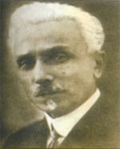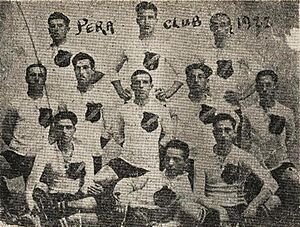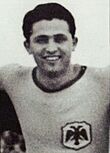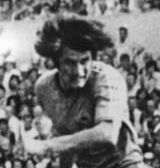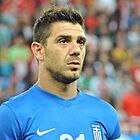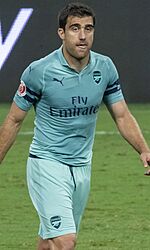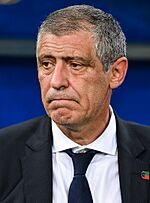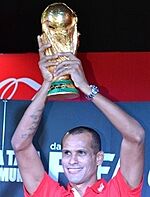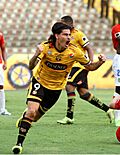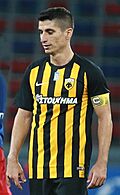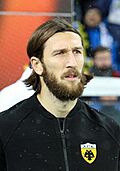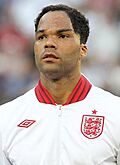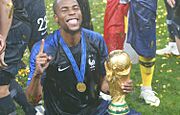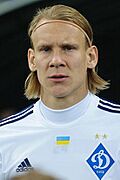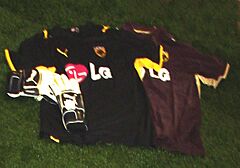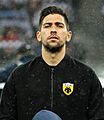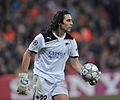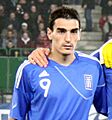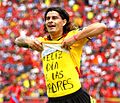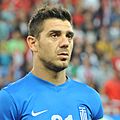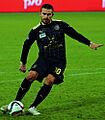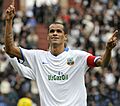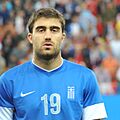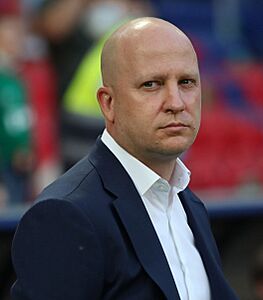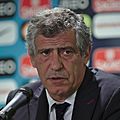AEK Athens F.C. facts for kids
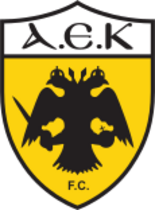 |
||||
| Full name | Αθλητική Ένωσις Κωνσταντινουπόλεως Athlitiki Enosis Konstantinoupoleos |
|||
|---|---|---|---|---|
| Nickname(s) | Dikéfalos (Double-Headed Eagle) Énosi (Union) Kitrinómavri (Yellow-blacks) |
|||
| Short name | AEK | |||
| Founded | 13 April 1924 | |||
| Ground | Agia Sophia Stadium | |||
| Capacity | 32,500 | |||
| Owner | Marios Iliopoulos | |||
| President | Evangelos Aslanidis | |||
| Head coach | Marko Nikolić | |||
| League | Super League Greece | |||
| 2024–25 | Super League Greece, 4th of 14 | |||
|
||||
| Top - 0-9 A B C D E F G H I J K L M N O P Q R S T U V W X Y Z |
A.E.K. Football Club (which means "Athletic Union of Constantinople" in Greek), often called A.E.K. or AEK Athens, is a professional football club from Nea Filadelfeia, Attica, Greece.
The club was started in Athens by Greek refugees from Constantinople after the Greco-Turkish War (1919–1922). AEK is one of the top three most successful teams in Greek football. They have won 32 national titles, including 13 Greek Championships, 16 Greek Cups, 1 League Cup, and 2 Super Cups. They are the only Greek club to have won all these competitions.
AEK has also played many times in European competitions like the UEFA Champions League and UEFA Europa League. They are the only Greek team to reach the semi-finals of the UEFA Cup (in 1976-77). They also reached the quarter-finals of the UEFA Cup Winners' Cup twice (in 1996-97 and 1997-98). AEK was the first Greek team to reach the quarter-finals of the European Cup (in 1968–69) and to play in the group stage of the UEFA Champions League (in 1994–95).
Club History
How AEK Started (1924–1944)
Many Greek people in Constantinople had sports clubs before World War I. These clubs helped promote Greek culture and sports. After a war, many athletes from these clubs moved to Athens and Thessaloniki.
The founders of AEK were a group of these refugees from Constantinople. They met in Athens in 1924 and decided to create AEK. Their goal was to offer sports and cultural activities for the thousands of refugees who had settled in new areas around Athens.
AEK's first team played its first match in November 1924, winning 2–0. The team quickly became popular in the 1920s. This was thanks to the many immigrants who joined, the important name "Constantinople," and the support from wealthy club members.
AEK's first president, Konstantinos Spanoudis, asked the government for land to build a sports ground. In 1926, land in Nea Filadelfeia was given for refugee sports. AEK started using it for training.
In 1930, the land was officially given to the club. Plans were approved to build what would become AEK's home for 70 years, the AEK Stadium. The first game there was in November 1930, a 2–2 draw against Olympiacos.
In 1932, AEK won their first Greek Cup title, beating Aris 5–3 in the final. The team had many star players like Kostas Negrepontis and Tryfon Tzanetis. The club had good success in the 1930s, winning their first Greek Championship and Greek Cup (the "double") in 1939. They also won the Greek Championship in 1940.
The Nestoridis-Papaioannou Era (1960–1974)
With Kostas Nestoridis scoring many goals in the early 1960s and the arrival of Mimis Papaioannou in 1962, AEK won the 1962–63 championship. Papaioannou is still the club's top goalscorer. AEK also won the Cup in 1964 and 1966. In 1968, AEK easily won another championship.
European Champions Cup Quarter-Finals
In the 1968–69 season, AEK became the first Greek football club to reach the quarter-finals of the European Champions Cup. They were eventually knocked out by Spartak Trnava. With new players, AEK won their fifth championship title in 1971.
The Great AEK of Barlos (1974–1981)
Loukas Barlos, a successful businessman, became president of AEK in 1974. He helped build one of the best teams in the club's history. This "Golden Era" saw many great players join AEK, including Dušan Bajević and Thomas Mavros.
UEFA Cup Semi-Finals
In the 1976–1977 season, AEK reached the semi-finals of the UEFA Cup. This was the first time a Greek football club had done this. They beat strong teams like Derby County and Red Star Belgrade. AEK was finally eliminated by Juventus, who went on to win the title.
Thomas Mavros: A Goal-Scoring Machine
During this time, AEK signed Thomas Mavros, one of Greece's best strikers. He is the all-time top goalscorer in the Greek Championship. He and Dušan Bajević formed a powerful attacking duo. Mavros's amazing goal-scoring helped AEK win the Championship-Cup double in 1978. They also won the 1979 Championship.
Under Loukas Barlos, the Nikos Goumas Stadium was completed with the famous "Skepasti" stand. This stand became home to the most passionate AEK fans, "Original 21." Young players like Stelios Manolas also started their careers during this period.
The 1980s and 1990s
In 1983, AEK won the Greek Cup, beating PAOK 2–0. They finally won the Championship again in 1989, after ten years. Takis Karagiozopoulos scored the winning goal against Olympiacos. AEK also won the Greek Super Cup in 1989.
Bajević's Golden Team: Three Championships in a Row
Under coach Dušan Bajević, AEK built one of its most successful teams ever. Led by captain Stelios Manolas, the team dominated the Greek league in the 1990s. They won three Championship titles in a row (1992, 1993, and 1994). AEK also won the only Greek League Cup ever organized in 1990.
First Greek Team in UEFA Champions League Group Stage
In 1994–95, AEK became the first Greek football club to play in the group stage of the UEFA Champions League. They beat Scottish champions Rangers to get there. The club won the Greek Cup in 1996.
After Bajević left, former player Petros Ravousis became coach. He led the team to its second Super Cup in 1996 and its eleventh Cup title in 1997. Both times, they beat Panathinaikos in the finals. AEK also reached the quarter-finals of the UEFA Cup Winners' Cup in 1996–97 and 1997–98.
In 1999, former president Dimitris Melissanidis organized a friendly match against Partizan in Belgrade. This was during a difficult time for Serbia. AEK players and staff traveled to Belgrade to show support. The game ended 1–1, and thousands of Serbian fans came onto the field to greet the players.
The 21st Century
AEK won its twelfth Cup title in 2000. In 2001–02, they finished second in the Championship and beat Olympiacos in the Greek Cup final.
Unbeaten in the 2002–03 UEFA Champions League
Dušan Bajević returned as coach in 2002. AEK had a strong team, called the "Dream Team" by fans. They played in the 2002 UEFA Champions League group stage against AS Roma, Real Madrid, and Racing Genk. AEK drew all their games and were unbeaten, but still didn't advance. They then played in the UEFA Cup.
Off the field, the club faced financial problems. In 2004, AEK's home stadium, Nikos Goumas Stadium, was torn down because it was damaged by an earthquake in 1999.
Demis Nikolaidis' Time as President
In 2004, former player Demis Nikolaidis and other AEK fans bought the club. Nikolaidis' main goal was to fix AEK's financial problems. He made a deal to reduce the club's huge debt. He also brought back Fernando Santos as coach. Fans showed their support by buying a record number of season tickets.
AEK signed promising young players. They reached the Greek Cup final and finished second in the Championship, earning a spot in the UEFA Champions League qualifiers. For the 2006–07 season, Lorenzo Serra Ferrer became the new coach.
AEK reached the Champions League group stage by beating Hearts. They earned 8 points in their group, beating AC Milan and Lille, and drawing twice with Anderlecht. AEK finished second in the Greek Super League again, qualifying for the Champions League qualifiers.
2007–08 Championship Controversy
For the 2007–08 season, AEK signed Brazilian legend Rivaldo, Rodolfo Arruabarrena, and Ismael Blanco. They were eliminated from the UEFA Champions League by Sevilla. AEK then played in the UEFA Cup, reaching the Round of 32.
AEK initially finished first in the league. However, after a court case involving Olympiacos, Olympiacos was awarded 3 points. This meant Olympiacos finished 2 points ahead of AEK and won the title. Many at AEK were upset by this decision.
Giorgos Donis became head coach in May 2008, but his time was difficult. AEK was eliminated from European competitions early. Rivaldo left the club. President Nikolaidis also left due to disappointing results and disagreements with fans.
Financial Problems and Relegation
The team's poor results continued. Coach Donis was asked to leave, and Dušan Bajević returned for his third time as head coach in November 2008. Bajević brought some stability. AEK reached the Greek Cup final in 2009, but lost on penalties. They finished second in the league playoffs, just missing out on Champions League qualification.
In 2010, AEK signed club legends Nikos Liberopoulos and Traianos Dellas. They qualified for the 2010–11 UEFA Europa League group stage. In April 2011, AEK won the Greek Cup for the 14th time.
Due to financial problems, AEK legend Thomas Mavros took over the club's management in 2012. Many former AEK players returned to help. However, after more bad results, AEK was relegated from the Super League in April 2013 for the first time in their history. This happened after fans stormed the pitch during a match, causing AEK to lose points.
Melissanidis Returns (2013–2024)
In June 2013, AEK decided to play in the third-tier Football League 2 to start fresh. Dimitris Melissanidis, a former president, returned to lead the club. He and other fans created a non-profit group to take over the club.
Traianos Dellas became the new head coach. He led AEK to first place in the third division. The next year, AEK finished first and unbeaten in the Football League, earning promotion back to the top league, the Super League Greece.
In October 2015, Dellas resigned. Gus Poyet was appointed, but later fired. Stelios Manolas took over as interim coach again. Manolas guided AEK to a 3rd-place finish and their first trophy since 2011, winning the Greek Cup. This first season back in the top league was seen as a success.
The next season, AEK signed big names like Dmytro Chyhrynskyi and Joleon Lescott. However, Lescott got injured and left the club. AEK was also knocked out of the Europa League qualifiers. After a slow start to the season, Temur Ketsbaia was replaced by José Morais, and then by Manolo Jiménez for his second time. Jiménez led the team to a 4th-place finish and first in the European Playoffs, qualifying for the Champions League qualifiers. They also reached a second consecutive Greek Cup final, but lost to PAOK.
Unbeaten in UEFA Europa League and Greek Champions
The 2017–18 season started with a loss in the Champions League qualifiers. AEK then played in the Europa League play-off round and qualified for the group stages for the first time in 6 years. They went through the group stage undefeated, with 1 win and 5 draws, including two 0–0 draws against AC Milan. They were eliminated in the Round of 32. In April 2018, AEK won their 12th Greek championship, their first in 24 years! They were crowned champions in front of their fans.
UEFA Champions League Return and Cup Finals
The 2018–19 season saw AEK return to the UEFA Champions League group stage for the fifth time. They eliminated Celtic and MOL Vidi in the qualifiers. In the group stage, they played against Bayern Munich, Benfica, and Ajax, but lost all six matches.
Many key players from the championship-winning team left. AEK finished 3rd in the league and lost their third consecutive Greek Cup final to PAOK. The 2019–20 season started poorly, with an early Europa League elimination. New managers came and went, including Massimo Carrera. Under Carrera, AEK improved and reached the Greek Cup final for the fifth time in a row, but lost to Olympiacos.
AEK qualified for the 2020–21 Europa League group stage. However, their European campaign was one of their worst, with only 1 win. Massimo Carrera was replaced by Manolo Jiménez for his fourth time at the club.
Major Signings, New Stadium, and Another Double
In 2021, AEK signed Vladan Milojević as coach, but he left early. Argiris Giannikis then took over, but his time was also short. AEK then hired Matías Almeyda as coach.
Before the 2022–23 season, AEK moved into their new Agia Sophia Stadium. Under Matias Almeyda, AEK played an exciting, attacking style of football. They quickly became one of the best teams in Greece. AEK had great derby victories and a 14-game winning streak at their new stadium.
The new Agia Sophia Stadium is built where the old Nikos Goumas Stadium used to be. It's a modern stadium that can hold 32,500 fans. The stadium opened on September 30, 2022. AEK Athens won their first game there, beating Ionikos 4–1 on October 3, 2022.
In the summer of 2022, AEK Athens signed two famous players who played against each other in the 2018 FIFA World Cup final: Croatian defender Domagoj Vida and French defender Djibril Sidibé. Sidibé was the most valuable player to ever join the club.
AEK Athens won the championship on May 14, 2023, after beating Volos 4–0. This was their 13th championship and their first in Nea Filadelfeia since 1994. On May 25, 2023, AEK Athens defeated PAOK 2–0 in the Greek Cup final, winning the "double" (both league and cup) for the first time since 1978.
In the 2023–24 season, AEK Athens battled PAOK for the title but lost on the final day. They were eliminated from the Greek Cup in the Round of 16 and from the UEFA Europa League group stage.
Marios Iliopoulos Era (2024 to Present)
After the 2023–24 season, Dimitris Melissanidis announced he was leaving the club's ownership. He sold his shares to Seajets owner, Marios Iliopoulos, in June 2024. Melissanidis stated he had brought AEK back to the top with a new stadium, a strong team, and no debt.
At his presentation, Iliopoulos shared his vision for the club. He wants AEK to be a dominant force in Greek football and a strong European team. He also plans to focus on the club's youth academies. He promised fans to "put on their seatbelts slowly and enjoy it." Soon after, Iliopoulos showed his commitment by selling Ezequiel Ponce for a club record €9,000,000. He also signed well-known players like Roberto Pereyra, Erik Lamela, and Thomas Strakosha with record contracts.
However, the 2024–25 season started with an early elimination from the Conference Cup by FC Noah. The club also had a very tough league playoff run, losing all 6 of their games.
On September 19, 2024, AEK announced the signing of former Manchester United player, Anthony Martial, on a three-year deal. This was the club's highest-valued player arrival. In October 2024, Javier Ribalta was announced as the new Executive Director.
In the 2024–25 Super League, AEK finished fourth. This led to the announcement that coach Matías Almeyda would leave after the season ended.
Club Emblem and Colors
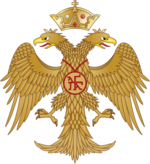
In 1924, AEK chose the image of a double-headed eagle as its emblem. This symbol, along with the club's yellow and black colors, was chosen to remember the lost homelands of the Greek refugees from Constantinople. The double-headed eagle is a symbol of the Greek Orthodox Church and was also an Imperial emblem of the Byzantine Empire.
AEK's emblem changed a few times over the years. In 1982, a specific design was officially copyrighted. The emblem was updated again in 1989, 1993, and 2013 to its current look.
AEK's Anthem
AEK's club anthem, "Embrós tis AEK Palikária" (Advance AEK's Lads), was written by Christos Kolokotronis and composed by Stelios Kazantzidis. The most popular version is sung by former football player Mimis Papaioannou.
: Εμπρός της ΑΕΚ παλληκάρια
|
|---|
: Let's go AEK's lads
|
Team Kit and Colors
AEK's yellow/gold and black colors were chosen because of the club's ties to Constantinople and the Byzantine Empire.
AEK usually wears gold or yellow shirts with black shorts. Sometimes, they have worn all-black or all-white away kits. On a few occasions, they have used a third kit in colors like light blue, silver, dark red, or purple, inspired by Byzantine history.
Shirt Sponsors and Manufacturers
Since June 1, 2021, AEK's kits have been made by Nike. Before that, other companies like Adidas, Puma, and Kappa made their kits.
Since 2015, the club's main shirt sponsors have been OPAP. Other past sponsors include Nissan, LG, and Jeep.
| Period | Kit manufacturer | Shirt sponsor |
|---|---|---|
| 1974–1975 | Adidas | — |
| 1975–1976 | Puma | |
| 1976–1982 | Adidas | |
| 1982–1983 | Citizen | |
| 1983–1985 | Zita Hellas | Nissan |
| 1985–1989 | Ethniki Asfalistiki | |
| 1989–1993 | Diadora | |
| 1993–1995 | Basic | Phoenix Asfaleies |
| 1995 | Kappa | Ethniki Asfalistiki |
| 1995 | Diadora | — |
| 1995–1996 | Kappa | Ethniki Asfalistiki |
| 1996–1998 | General Bank of Greece | |
| 1999 | Firestone | |
| 1999–2000 | Marfin Investment Group | |
| 2000–2001 | Nike | |
| 2001–2002 | Alpha Digital | |
| 2002–2004 | Piraeus Bank | |
| 2004 | TIM | |
| 2005–2006 | Adidas | |
| 2006–2007 | LG | |
| 2007–2009 | Puma | |
| 2009–2010 | Diners Club | |
| 2010–2013 | Kino | |
| 2013–2014 | Tzoker | |
| 2014–2015 | Jeep | |
| 2015–2018 | Nike | Pame Stoixima |
| 2018–2021 | Capelli | |
| 2021– | Nike |
Financial Information
AEK Athens has had different owners and financial situations throughout its history. In 1979, Greek football became professional. In 1992, Dimitris Melissanidis and Giannis Karras took over and led the club to successful seasons.
After some difficult times, including financial problems and relegation in 2013, Dimitris Melissanidis returned to help save the club. He worked with other fans to create a non-profit group that took control of the football club.
In 2015, AEK FC became the first Greek company listed in the London Stock Exchange's Elite program, which helps growing businesses.
Current main sponsors include OPAP and Nike. Other official sponsors are Piraeus Bank, Cosmote, LG, and Seajets.
Stadiums and Training
Home Stadiums
Nikos Goumas Stadium was AEK's home from 1930. It was in Nea Filadelfeia. The stadium was badly damaged by an earthquake in 1999 and torn down in 2003.
From 2004, the club played at the 70,000-capacity "Spyros Louis" (Athens Olympic Stadium) in Athens. This stadium has hosted many important sports events, including the 2004 Summer Olympics.
Construction for a brand new stadium began on July 28, 2017, at the site of the old Nikos Goumas stadium. It was finished in 2022. The new stadium, Agia Sophia Stadium, can hold about 32,500 fans. It has a special underground road system for teams to enter.
The Agia Sophia Stadium also has The Museum of Refugee Hellenism of AEK Athens. The stadium officially opened on September 30, 2022. AEK Athens won their first game there, 4–1 against Ionikos, on October 3, 2022.
| Stadium | Capacity | Years |
|---|---|---|
| Nikos Goumas Stadium | 27,729 | 1928–1985 and 1987–2003 |
| Athens Olympic Stadium | 69,618 | 1985–1987 and 2004–2022 |
| Agia Sophia Stadium | 32,500 | 2022– |
Training Facility
Since December 2010, AEK has used modern training facilities in Spata. This is one of the biggest and most expensive training centers in Greece. It has natural and artificial grass fields, a football studio, and well-equipped areas for team preparation. The main building has offices, a press room, and player rooms. The training ground is used by both the first team and youth teams. It also has a fitness and health center. In 2018, Dimitris Melissanidis bought the Sports Centre and donated it to AEK. He also bought more land to expand the training area.
Supporters and Rivalries
AEK's Fan Base
AEK Athens has a large fan base across Greece and is one of the most popular Greek football teams. They have a strong following in areas like Nea Filadelfeia and other parts of Athens.
AEK also has many fans in the Greek diaspora, especially in Cyprus. Many Greek Cypriots feel a connection to AEK because it is a refugee club, similar to their own experiences after the Turkish invasion of Cyprus. AEK also has fans in Australia, the US, the UK, Germany, and France.
The most dedicated AEK supporters are "Original 21." This is the club's largest fan group, known for its loyal and passionate support.
Supporter Friendships
AEK fans have friendships with other clubs' fans, especially those with similar left-wing political views. This includes fans of Marseille and Livorno. There is also a strong friendship between AEK and St. Pauli fans for similar reasons.
There is an informal friendship between AEK and Fenerbahçe fans. In a 2017 Euroleague final, Fenerbahçe fans displayed a banner that read "Same City's Sons," showing their connection.
Rivalries
AEK FC has big rivalries with Panathinaikos and Olympiacos.
The rivalry with Panathinaikos, their city neighbors, is called the Athens local football derby. It started because both teams compete for major titles. Also, many AEK fans have refugee backgrounds, while Panathinaikos was seen as representing Athens' high society.
The rivalry with Olympiacos, a club from Piraeus, comes from both being very successful Greek football clubs. This rivalry became even stronger after 1996 when AEK's former star player and manager Dušan Bajević moved to Olympiacos. It was also fueled by the controversial 2007–08 Super League season, which Olympiacos won after a court decision.
Club Achievements
| Type | Competition | Titles | Seasons |
|---|---|---|---|
| Domestic | Super League Greece | 13 | 1938–39, 1939–40, 1962–63, 1967–68, 1970–71, 1977–78, 1978–79, 1988–89, 1991–92, 1992–93, 1993–94, 2017–18, 2022–23 |
| Super League Greece 2 | 1 | 2014–15 | |
| Gamma Ethniki | 1 | 2013–14 | |
| Greek Football Cup | 16 | 1931–32, 1938–39, 1948–49, 1949–50, 1955–56, 1963–64, 1965–66, 1977–78, 1982–83, 1995–96, 1996–97, 1999–00, 2001–02, 2010–11, 2015–16, 2022–23 | |
| Greek League Cup | 1 | 1990 | |
| Greek Super Cup | 2 | 1989, 1996 |
- record
Doubles
AEK has won both the Greek Championship and the Greek Cup in the same season three times:
- 1938–39
- 1977–78
- 2022–23
European Competitions
AEK has had notable runs in European competitions:
- UEFA Champions League: Reached the Quarter-finals once (1968–69).
- UEFA Europa League: Reached the Semi-finals once (1976–77).
- UEFA Cup Winners' Cup: Reached the Quarter-finals twice (1996–97, 1997–98).
Regional and Unofficial Titles
AEK has also won several regional and unofficial tournaments throughout its history.
European Performance Highlights
AEK Athens has had several memorable seasons in European football. They reached the Quarter-finals of the European Cup in 1968–69. In the UEFA Cup, they made it to the Semi-finals in 1976–77, which is their best European performance. They also reached the Round of 16 in the UEFA Cup multiple times. In the UEFA Cup Winners' Cup, AEK reached the Quarter-finals in both 1996–97 and 1997–98.
A notable achievement was in the 2002–03 UEFA Champions League, where AEK went unbeaten in the group stage, drawing all six of their matches against strong teams like Real Madrid and AS Roma. In the 2017–18 UEFA Europa League, they also went undefeated in their group stage.
Players
Current Squad
|
|
Players on Loan
|
One-Club Men
These players spent their entire professional careers playing only for AEK:
| Player | Position | Debut | Last match |
|---|---|---|---|
| FW | 1927 | 1933 | |
| GK | 1929 | 1947 | |
| FW | 1933 | 1950 | |
| MF | 1933 | 1949 | |
| FW | 1934 | 1952 | |
| GK | 1938 | 1955 | |
| MF | 1944 | 1956 | |
| DF | 1948 | 1957 | |
| FW | 1950 | 1969 | |
| GK | 1953 | 1972 | |
| GK | 1977 | 1996 | |
| DF | 1979 | 1998 |
Top Scorers in Super League
AEK has a strong history of great strikers. Many players from AEK have been the top goalscorer in the Super League.
| Rank | Player | Times | Season(s) |
|---|---|---|---|
| 1 | 5 (national record) | 1959–1963 | |
| 2 | 3 | 1978, 1979, 1985 | |
| 3 | 2 | 1992, 1993 | |
| 4 | 2 | 1964, 1966 | |
| 5 | 2 | 2008, 2009 | |
| 6 | 2 | 1939, 1940 | |
| 7 | 1 | 1994 | |
| 8 | 1 | 2007 | |
| 9 | 1 | 1939 | |
| 10 | 1 | 1976 | |
| 11 | 1 | 1999 | |
| 12 | 1 | 1996 | |
| 13 | 1 | 1980 | |
| 14 | 1 | 1988 |
Player Records
- Most club appearances: 593 – Stelios Manolas
- Most club goals: 299 – Mimis Papaioannou
Manager Records
- Most club titles: 8 – Dušan Bajević
Contribution to the Greece National Team
AEK has produced many great Greek players who also played for the national team. These include famous names like Mimis Papaioannou, Kostas Nestoridis, and Thomas Mavros.
Five players from AEK were part of the Greek team that won the UEFA Euro 2004:
- Theodoros Zagorakis (who was named player of the tournament), Vasilios Tsiartas, Michalis Kapsis, Kostas Katsouranis, Demis Nikolaidis, and Vasilios Lakis.
As of July 10, 2025, a total of 113 AEK players have played for the Greece national football team.
Notable Former Players
Club Personnel
Ownership and Board
| Position | Staff |
|---|---|
| Owner | |
| President | |
| 1st Vice President & CEO | |
| 2nd Vice President | |
| 3rd Vice President | |
| Board Members |
Source: AEK Athens F.C.
Executives
Administration Department
| Position | Staff |
|---|---|
| General Manager | |
| CFO | |
| Commercial Director | |
| Press Officer |
Source: AEK Athens F.C.
Football Department
| Position | Staff |
|---|---|
| Director of Football | |
| Deputy Director of Football | |
| Head of Football Operations | |
| Team Managers |
Source: AEK Athens F.C.
Coaching and Medical Staff
- Coaching Staff
Source: AEK Athens F.C.
- Medical Staff
Source: AEK Athens F.C.
- Other Staff
| Position | Staff |
|---|---|
| Team manager assistant | |
| Kit mens |
Source: AEK Athens F.C.
Presidents of AEK Athens
| AEK Athens F.C. presidential history from 1924 to present | ||
|---|---|---|
|
|
|
Notable Managers
-
The 'Mighty Magyar', Ferenc Puskás, manager of the club in the 1978–79 season
-
Dušan Bajević 4 times Alpha Ethniki champion, 1 time Greek Cup, Greek League Cup and Greek Super Cup winner
-
Manolo Jiménez 2017–18 Greek Super League champion and 2010–11 Greek Cup winner
-
Traianos Dellas led the club to promotion to the Greek Super League
-
Matías Almeyda 2022–23 Greek Super League champion and 2022–23 Greek Cup winner
| Manager | From | To | Trophies | |||||||
|---|---|---|---|---|---|---|---|---|---|---|
| 1933 1937 1944 1955 1958 |
1936 1940 1948 1956 1959 |
2 Greek Leagues 1 Greek Cup |
||||||||
| 1948 | 1951 | 2 Greek Cups | ||||||||
| 1952 | 1953 | — | ||||||||
| 1954 1956 1960 1965 |
1955 1957 1962 1966 |
1 Balkans Cup Runner-up | ||||||||
| 1963 | 1964 | 1 Greek Cup | ||||||||
| 1962 1967 |
1963 1968 |
2 Greek Leagues | ||||||||
| 1968 | 1973 | 1 Greek League | ||||||||
| 1973 | 1974 | — | ||||||||
| 1974 | 1977 | — | ||||||||
| 1977 1982 |
1978 1982 |
1 Greek League 1 Greek Cup |
||||||||
| 1978 | 1979 | — | ||||||||
| 1983 | 1983 | 1 Greek Cup | ||||||||
| 2000 | 2001 | 1 Greek Cup | ||||||||
| 2001 2004 |
2002 2006 |
1 Greek Cup | ||||||||
| 2006 | 2008 | — | ||||||||
| 1988 2002 2008 |
1996 2004 2010 |
4 Greek Leagues 1 Greek Cup 1 Greek League Cup 1 Greek Super Cup |
||||||||
| 2010 2017 |
2011 2018 |
1 Greek Cup 1 Greek League |
||||||||
| 2013 | 2015 | 1 Football League 2 1 Football League |
||||||||
| 2015 2016 |
2015 2016 |
1 Greek Cup | ||||||||
| 2022 | 2025 | 1 Greek League 1 Greek Cup |
||||||||
- Key
-
- Served as caretaker manager.
See also
 In Spanish: AEK (fútbol) para niños
In Spanish: AEK (fútbol) para niños
- A.E.K. (sports club)
- AEK Athens B F.C.
- AEK Athens F.C. Academy
- History of AEK Athens F.C.
- List of AEK Athens F.C. seasons
- List of AEK Athens F.C. records and statistics
- List of AEK Athens F.C. managers
- AEK Athens F.C. in European football
- European Club Association


